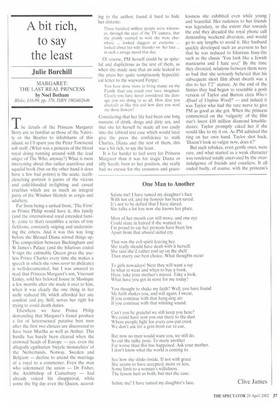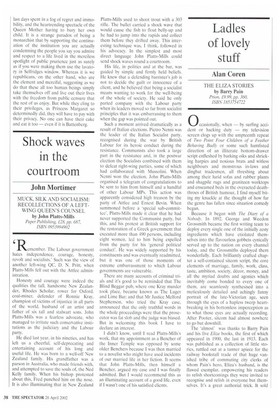A bit rich, to say the least
Julie Burchill
MARGARET: THE LAST REAL PRINCESS by Noel Botham Blake. £16.99. pp. 370, ISBN 1903402646 The details of the Princess Margaret Story are as familiar as those of the Nativity or the Beatles to inhabitants of this island. so I'll spare you the Peter Townsend sob stuff. (What was a princess of the blood royal doing running around with the lead singer of The Who, anyway?) What is most interesting about this rather scurrilous and squalid book (but on the other hand it does have a few bad points) is the acute, teethclenching portrait it paints of the vicious and cold-blooded in-fighting and casual cruelties which are as much an integral party of the Windsor lifestyle as corgis and adultery.
Far from being a united front, 'The Firm' as Prince Philip would have it, this family (and the international royal extended family, come to that) resembles a series of tiny fiefdoms, constantly sniping and undermining the others. And it was this way long before the Blessed Diana stirred things up. The competition between Buckingham and St James's Palace (and the hilarious coded V-sign the estimable Queen gives the useless Prince Charles every time she makes a speech in which she vows never to abdicate) is well-documented, but I was amazed to read that Princess Margaret's son, Viscount Linley, sold her beloved house in Mustique a few months after she made it over to him, when it was clearly the one thing in her sadly reduced life which afforded her any comfort and joy. Still, serves her right for trying to avoid death duties.
Elsewhere we have Prince Philip demanding that Margaret's fiancé produce a list of heterosexual putative best men after the first two choices are discovered to have been Martha as well as Arthur. This hurdle has barely been cleared when the crowned heads of Europe — yes, even the allegedly egalitarian 'bicycle monarchies' of the Netherlands, Norway, Sweden and Belgium — decline to attend the marriage of a royal to a commoner. Even the man who solemnised the union — Dr Fisher, the Archbishop of Canterbury — had already voiced his disapproval, while come the big day even the Queen, accord
ing to the author, found it hard to hide her distaste:
Three hundred million people were witnesses. through the eyes of the TV camera, that she plainly seemed to wish she were elsewhere ... looked daggers at everyone ... looked about her with thunder on her face ... in such a savage mood that day.
Of course, PM herself could be as spiteful and duplicitous as the rest of them, as when she made sure that an aide leaked to the press her quite sumptuously hypocritical letter to the wayward Fergie:
You have done more to bring shame on the Family than you could ever have imagined. Clearly you have never considered the damage you are doing to us all. How dare you discredit us like this and how dare you send me those flowers?
Considering that her life had been one long tsunami of drink, drugs and dirty sex, and that she let herself be made all too easily into the tabloid test case which would later give the press the confidence to stalk Charles, Diana and the rest of them, this was a bit rich, to say the least.
It is far harder to feel sorry for Princess Margaret than it was for tragic Diana or silly Sarah; horn to her position, she really had no excuse for the crassness and grace lessness she exhibited even while young and beautiful. Her rudeness to her friends was legendary, to the extent that towards the end they dreaded the royal phone call demanding weekend diversion, and would go to any lengths to avoid it. Her husband quickly developed such an aversion to her that he was reduced to hilarious hissy-fits such as the classic 'You look like a Jewish manicurist and I hate you!' By the time they divorced, relations between them were so bad that she seriously believed that his subsequent short film about dwarfs was a diss to her 5'2" stature. At the end of the Sixties they had begun to resemble a posh version of Taylor and Burton circa Who's Afraid of Virginia Woolf? — and indeed it was Taylor who had the rare nerve to give PM as good as she got. When the princess commented on the 'vulgarity' of the film star's latest f10 million diamond knuckleduster, Taylor promptly asked her if she would like to try it on. As PM admired the ring on her own hand, Taylor shot back, 'Doesn't look so vulgar now, does it?'
But such rebukes, even gentle ones, were rare. and what started as a weak character was rendered totally, enervated by the overindulgence of friends and courtiers. It all ended badly, of course, with the princess's last days spent in a fog of regret and immobility, and the heartrending spectacle of the Queen Mother having to bury her own child. It is a strange paradox of being a monarchist that by supporting the continuation of the institution you are actually condemning the people you say you admire and respect to a life lived in the merciless spotlight of public prurience just as surely as if you were making them use the lavatory in Selfridges window. Whereas it is we republicans,on the other hand, who are the clement and merciful, suggesting as we do that these all too human beings simply take themselves off and live out their lives with the freedom from public censure that the rest of us enjoy. But while they cling to their privileges, as Princess Margaret so determinedly did, they will have to pay with their privacy. No one can have their cake and eat it too — even if it is Battenberg.







































































 Previous page
Previous page